Yes, you can clean your own boiler if you understand its components and follow safety precautions. Make certain to turn off the power, wear protective gear, and check for leaks before starting. Gather tools like a vacuum, soft brush, and scraper. A systematic cleaning process helps maintain efficiency and longevity. However, if you notice unusual signs or issues, it might be time to contemplate professional help to guarantee peak performance. Further details on this process await you.
Key insights
- Yes, you can clean your own boiler, but safety precautions must be prioritized, such as wearing protective gear and turning off the power supply.
- Familiarize yourself with your boiler type and its components to effectively perform cleaning and maintenance tasks.
- Gather necessary tools like a vacuum, soft brushes, and a scraper to ensure a thorough cleaning process.
- Regular maintenance can prevent malfunctions, but recognize when to seek professional help for complex issues or persistent problems.
- Cleaning your boiler can improve efficiency and reduce utility bills, making it a worthwhile DIY task if done safely.
Understanding Your Boiler System
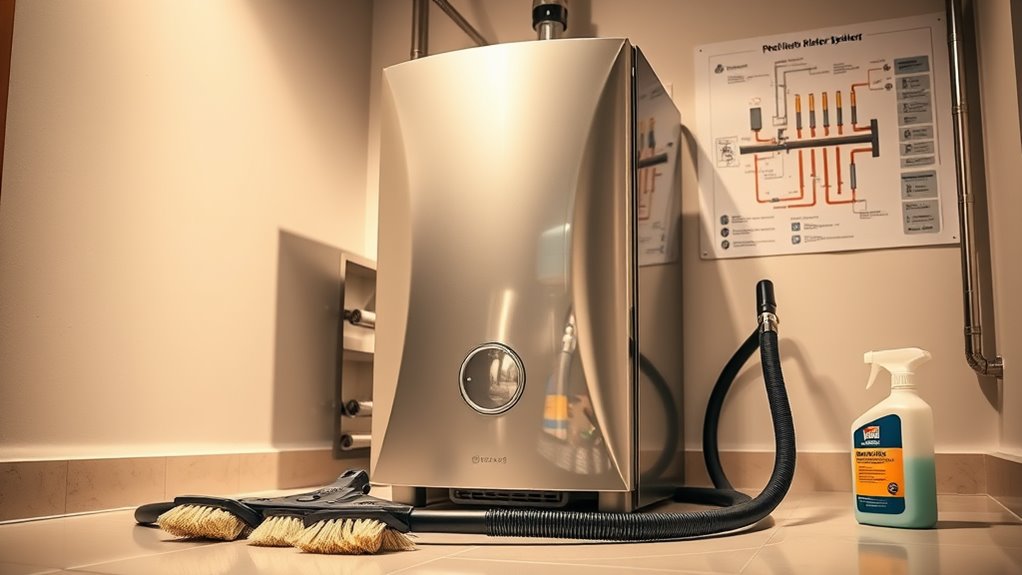
Before you attempt to clean your boiler, it's important to understand how your boiler system operates. Different boiler types, such as combi, system, and conventional boilers, have unique configurations and functionalities. Familiarize yourself with the main system components: the burner, heat exchanger, flue, and pump. The burner ignites the fuel or heats water, while the heat exchanger transfers that heat to the water circulating through the system. The flue expels exhaust gases, ensuring efficient operation. The pump circulates the heated water to radiators or underfloor heating. Understanding these components will help you identify areas that require cleaning and maintenance, leading to improved efficiency and longevity of your boiler system. Proper knowledge is key before undertaking any cleaning tasks. Regular commercial boiler service ensures safe and efficient operation, helping to prevent any potential issues.
Safety Precautions Before Cleaning
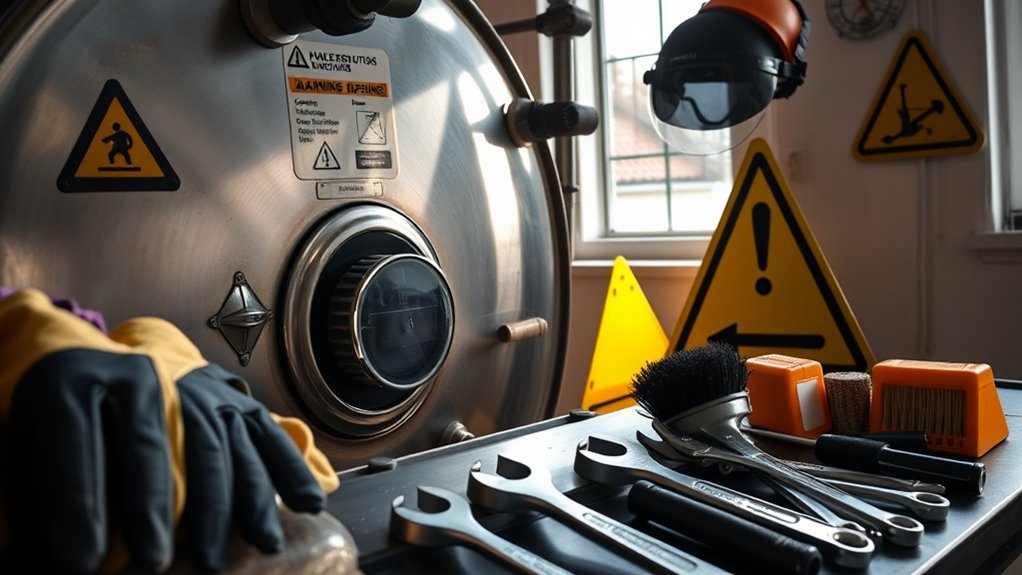
Before you begin cleaning your boiler, it's essential to turn off the power to prevent any electrical hazards. Confirm you're wearing appropriate protective gear, such as gloves and goggles, to shield yourself from potential injuries. Additionally, check for any leaks in the system to guarantee a safe working environment. Regular inspections are crucial for maintaining ongoing compliance and ensuring the safety of your gas appliances.
Turn Off Power
Turning off the power to your boiler is an essential first step in guaranteeing your safety during the cleaning process. This vital action prevents any accidental activation while you perform necessary boiler maintenance. Follow these steps for ideal power safety:
- Locate the Power Switch: Identify the main power switch or circuit breaker specific to your boiler.
- Switch Off: Turn off the power completely to eliminate electrical hazards.
- Verify: Use a multimeter to confirm there's no residual voltage before starting your cleaning. Regular maintenance of your boiler is crucial for energy efficiency, ensuring it operates safely and effectively.
Wear Protective Gear
Wearing protective gear is essential when cleaning your boiler to guarantee your safety and minimize exposure to potential hazards. Start by donning durable protective gloves to shield your hands from sharp edges, chemicals, or debris. These gloves should be resistant to heat and cuts, ensuring they provide adequate protection during the cleaning process. Next, put on safety goggles to safeguard your eyes from dust, splashes, or flying particles. This is vital, as the boiler's interior may contain accumulated residue that can irritate or injure your eyes. Additionally, consider wearing a mask to prevent inhalation of harmful substances. By taking these precautions seriously, you greatly reduce the risk of injury, allowing you to focus on the task of cleaning your boiler effectively and safely. Regular maintenance can help prevent common boiler issues that arise from neglect.
Check for Leaks
Once you've equipped yourself with the necessary protective gear, it's important to check for leaks before starting the cleaning process. Proper leak detection guarantees safety and prevents further damage. Here are three steps to follow:
- Visual Inspection: Examine all visible pipes, joints, and connections for signs of moisture or corrosion.
- Pressure Test: Use a pressure gauge to check the system's integrity. A drop in pressure may indicate a leak.
- Soapy Water Method: Apply a soapy solution to suspected areas. Bubbles forming indicate a leak.
If you identify any leaks, employ appropriate repair methods immediately. Ignoring leaks can lead to significant hazards and costly repairs, so don't skip this essential step before cleaning your boiler. Regular maintenance helps prevent error codes and enhances boiler longevity.
Tools and Materials Needed for Boiler Cleaning
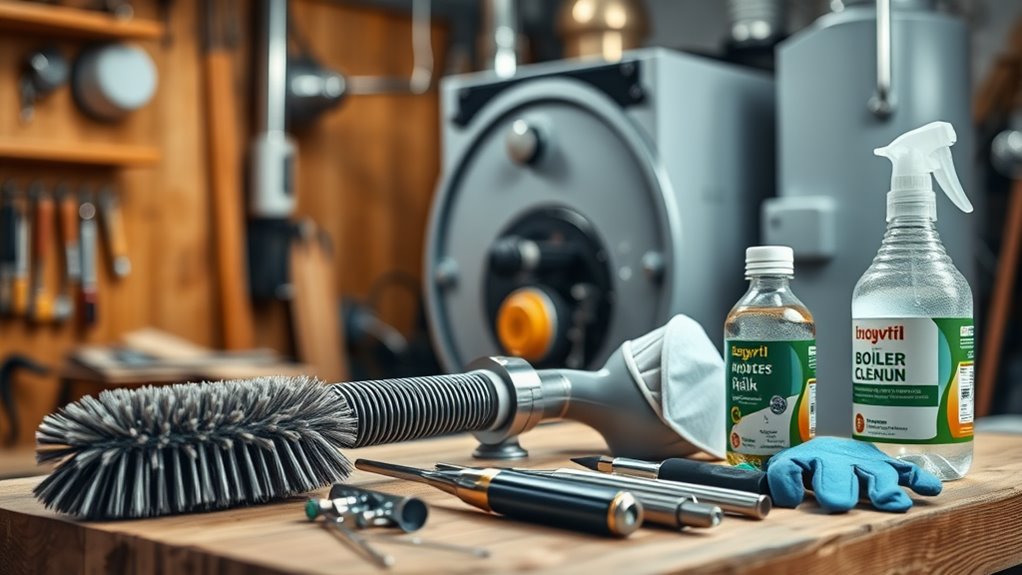
To effectively clean your boiler, you'll need a specific set of tools and materials designed for the task. Start with basic cleaning supplies, including a vacuum with a brush attachment, a soft brush, and a damp cloth. You'll also require a bucket for collecting debris and a scraper for removing stubborn buildup. Don't forget protective gear, such as gloves and goggles, to guarantee your safety. A multimeter can help you check electrical components, while a pressure gauge is essential for monitoring system pressure. Finally, refer to your maintenance checklist to make certain you gather all necessary items before beginning the cleaning process. This preparation will streamline your efforts and contribute to a thorough boiler cleaning. Regular maintenance is crucial for peak boiler performance, ensuring that your system runs efficiently and effectively.
Step-by-Step Guide to Cleaning Your Boiler
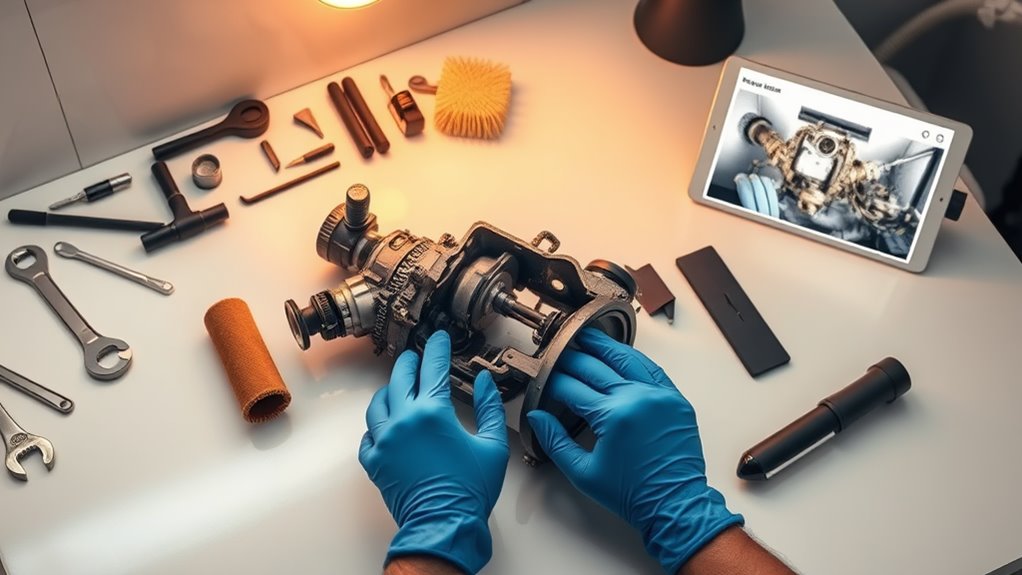
Before you start cleaning your boiler, you need to prioritize safety precautions to protect yourself and your equipment. Gather all necessary cleaning tools to guarantee you can efficiently complete the task without interruption. With the right preparations, you can effectively maintain your boiler's efficiency and longevity. Regular maintenance, including commercial power flush services, is essential for prolonging your boiler's lifespan and ensuring optimal performance.
Safety Precautions First
While cleaning your boiler can enhance its efficiency and longevity, prioritizing safety is essential to prevent accidents and injuries. Before you start, verify you follow these critical safety precautions:
- Wear appropriate safety gear: Use gloves, goggles, and a mask to protect yourself from dust and hazardous materials.
- Turn off the power supply: Always disconnect the boiler from the power source to avoid electric shock or unintended activation.
- Review emergency procedures: Familiarize yourself with the emergency shut-off locations and protocols in case of a malfunction or accident. Additionally, ensure you understand the importance of preventive maintenance tips to maintain boiler safety and performance.
Cleaning Tools Needed
Cleaning your boiler requires specific tools to guarantee a thorough and safe job. First, gather essential maintenance tools like a screwdriver set, adjustable wrench, and a multimeter for checking electrical components. You'll also need a vacuum with a brush attachment to remove dust and debris from hard-to-reach areas.
For cleaning supplies, invest in a degreaser and a soft cloth to tackle oil stains and residues. A stiff-bristle brush is useful for scrubbing surfaces without damaging delicate components. Don't forget safety goggles and gloves to protect yourself during the process. By having these tools and supplies on hand, you can assure an effective cleaning that promotes the longevity and efficiency of your boiler. Additionally, regular cleaning can help prevent issues like flue or air pressure problems that may lead to boiler malfunctions.
Signs Your Boiler Needs Professional Attention
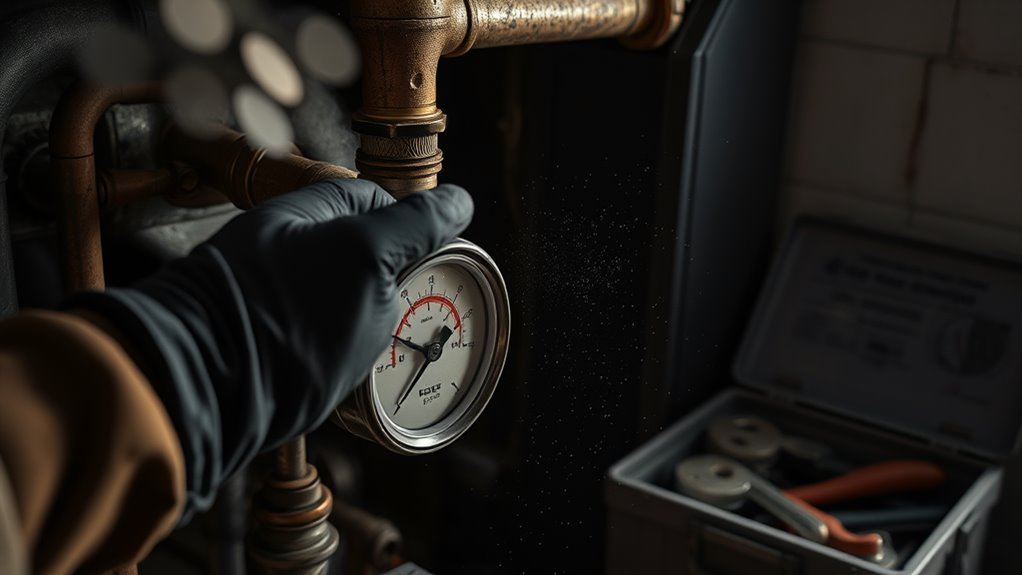
Recognizing when your boiler requires professional attention is essential for maintaining its efficiency and safety. Ignoring warning signs can lead to more significant issues and costly repairs. Here are three signs to watch for:
- Unusual Boiler Noises: If you hear banging, whistling, or gurgling sounds, it may indicate a problem with the internal components or air trapped in the system.
- Low Water Pressure: A significant drop in water pressure can signal leaks or a failing pump, which needs immediate investigation. Low water pressure can directly affect boiler functionality and should be addressed promptly.
- Inconsistent Heating: If some rooms are cold while others are warm, your boiler may not be functioning correctly and should be assessed by a professional.
Addressing these issues promptly can prevent further damage and guarantee your boiler operates efficiently.
Benefits of Regular Boiler Maintenance
Regular boiler maintenance is essential for guaranteeing ideal performance and longevity, as it helps identify potential issues before they escalate into costly repairs. By scheduling routine inspections, you enhance your boiler's efficiency, which directly translates to energy savings. Improved efficiency means your system operates at peak levels, reducing fuel consumption and lowering utility bills. Additionally, regular maintenance allows for early detection of wear and tear, preventing breakdowns that require expensive repairs. This proactive approach not only guarantees safety but also extends the lifespan of your boiler. Ultimately, the cost savings from improved efficiency and reduced repair needs can greatly outweigh the expenses associated with maintenance, making it a smart investment for any homeowner.
Frequently Asked Questions
How Often Should I Clean My Boiler?
You should prioritize boiler maintenance to guarantee efficiency and safety. For most systems, a thorough cleaning frequency is recommended at least once a year. This annual cleaning helps remove buildup, reduces wear, and improves performance. If you notice unusual noises or decreased heating efficiency, consider scheduling additional cleanings. Regular maintenance not only prolongs your boiler's lifespan but also enhances energy efficiency, ultimately saving you money on heating costs.
Can I Use Vinegar for Cleaning My Boiler?
Using vinegar for cleaning your boiler can be effective due to its acidity, which helps dissolve mineral deposits. However, it's essential to guarantee compatibility with your boiler's materials, as vinegar might not be suitable for all systems. While vinegar offers a natural cleaning alternative, you should also consider commercial cleaning solutions designed specifically for boilers. These alternatives often provide more thorough cleaning and are formulated to protect your system's components. Always consult your manufacturer's recommendations.
What Should I Do With Old Boiler Parts?
When dealing with old boiler parts, you should prioritize recycling boiler parts whenever possible. Many components, like metals, can be repurposed, reducing waste. If recycling isn't an option, make sure you're disposing of old components responsibly. Check local regulations for hazardous materials, as some parts may require special handling. Additionally, consider contacting a professional service for proper disposal methods, making certain you comply with safety and environmental standards.
Is a Dirty Boiler Dangerous?
A dirty boiler can indeed pose serious risks to boiler safety. Accumulated debris and soot can obstruct vents, leading to carbon monoxide buildup or inefficient operation. If not cleaned properly, you might also expose yourself to cleaning risks, including injury or damage to the system. Regular maintenance helps prevent these dangers, ensuring your boiler runs efficiently and safely. Always consider professional assistance if you're unsure about handling the cleaning process yourself.
Can I Hire a Professional for Partial Cleaning?
Yes, you can hire a professional for partial cleaning of your boiler. Professional services often utilize specialized cleaning methods that guarantee thorough maintenance while adhering to safety standards. They can focus on specific components that need attention, preventing potential issues down the line. By employing experts, you gain access to their knowledge and equipment, which can enhance your boiler's efficiency and longevity. It's a smart choice for maintaining peak performance.
Summary
In summary, while you can clean your own boiler, it's essential to prioritize safety and follow the proper procedures. Regular maintenance not only enhances efficiency but also extends the lifespan of your system. However, if you notice persistent issues or signs of wear, don't hesitate to call a professional. By staying proactive about your boiler's upkeep, you guarantee a safe and comfortable environment in your home, ultimately saving on costly repairs down the road.

